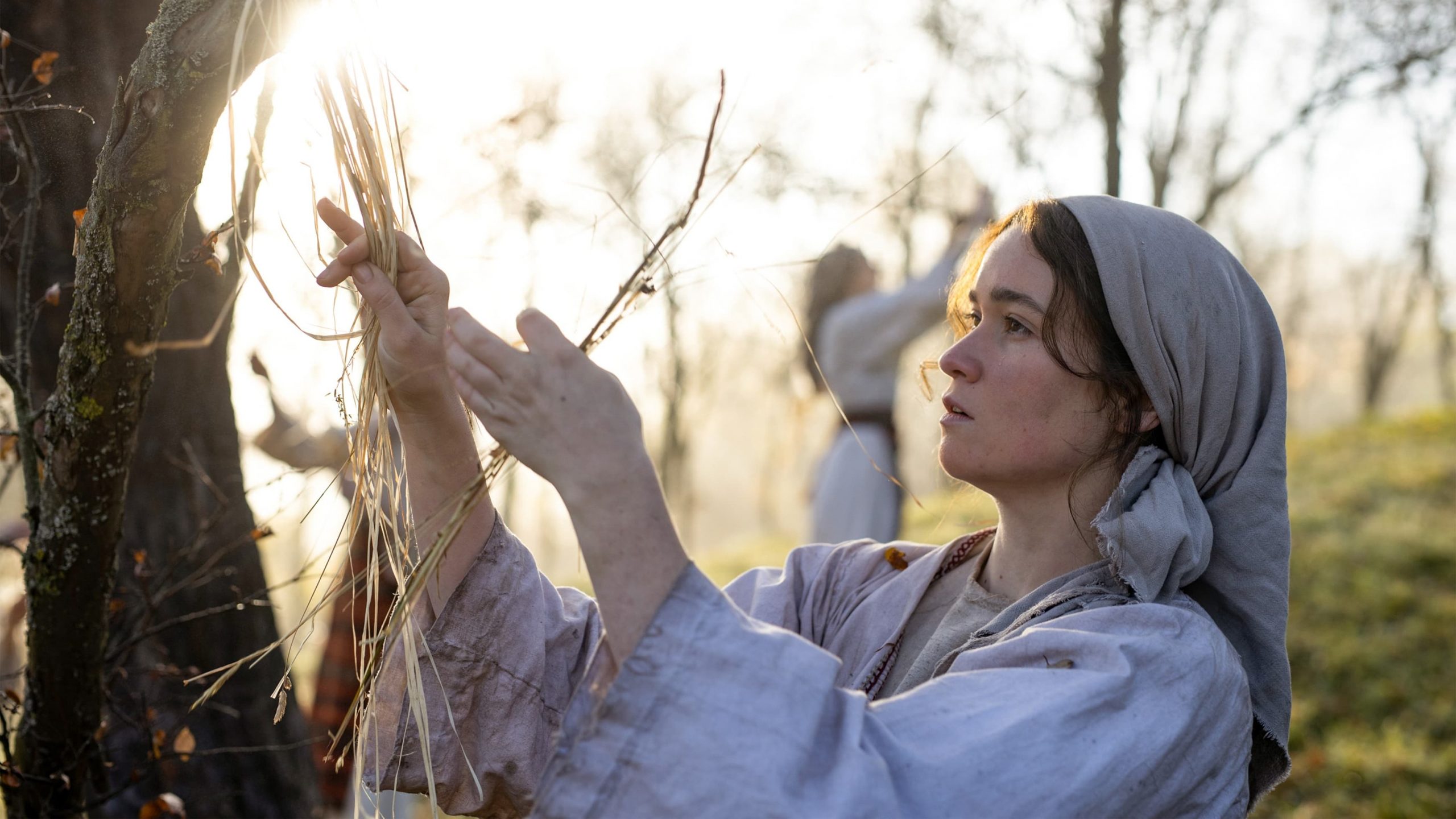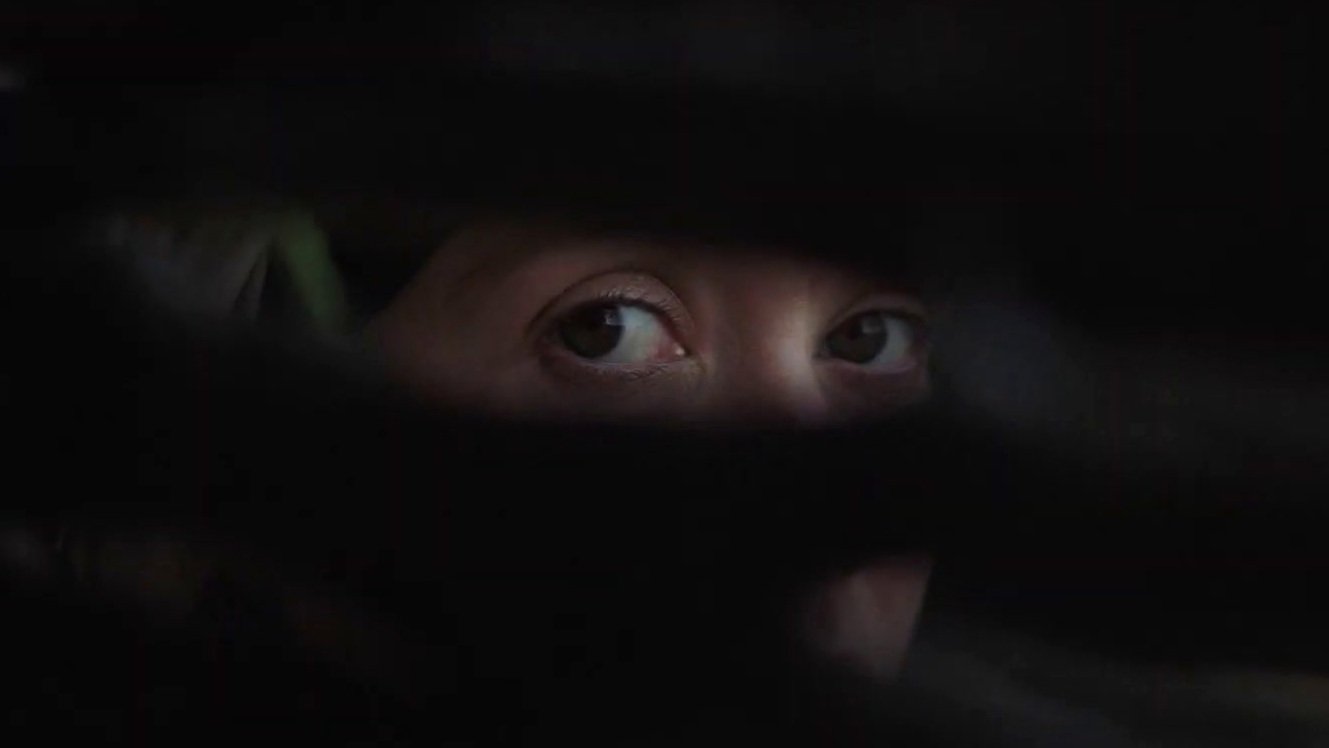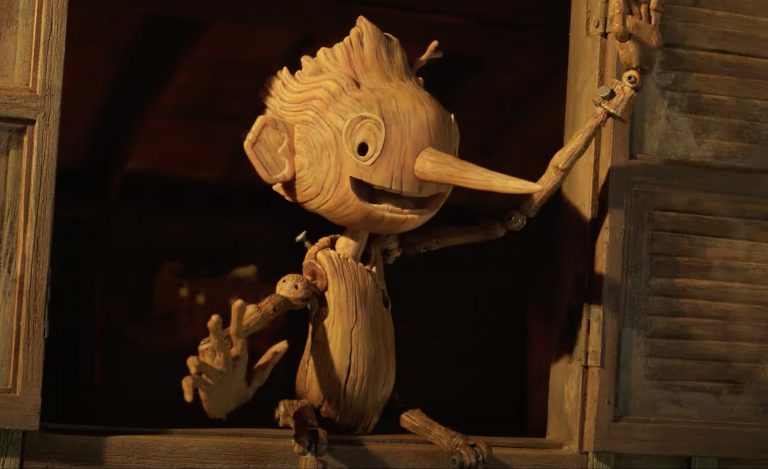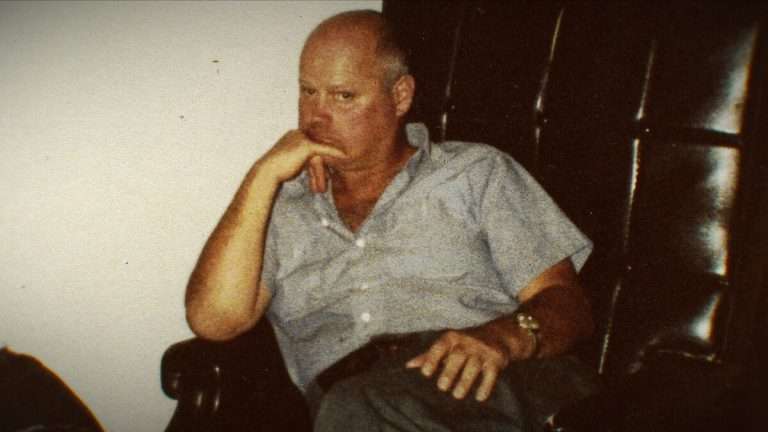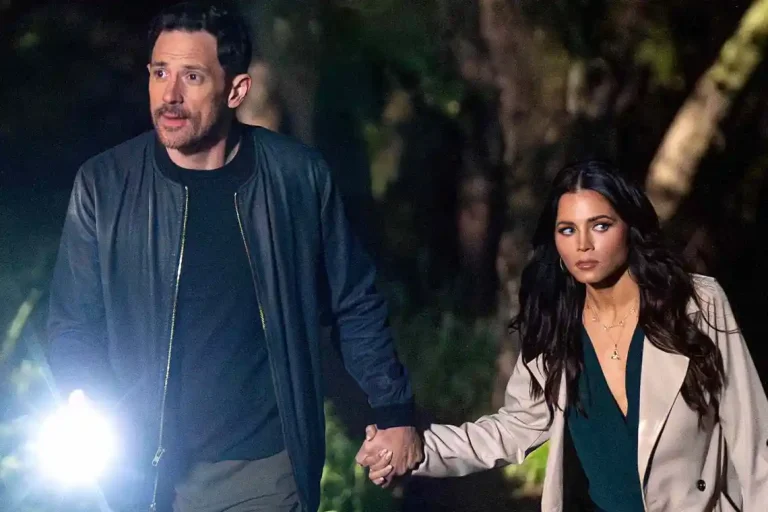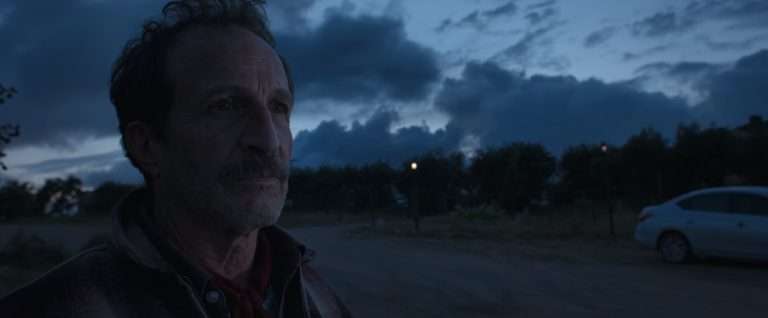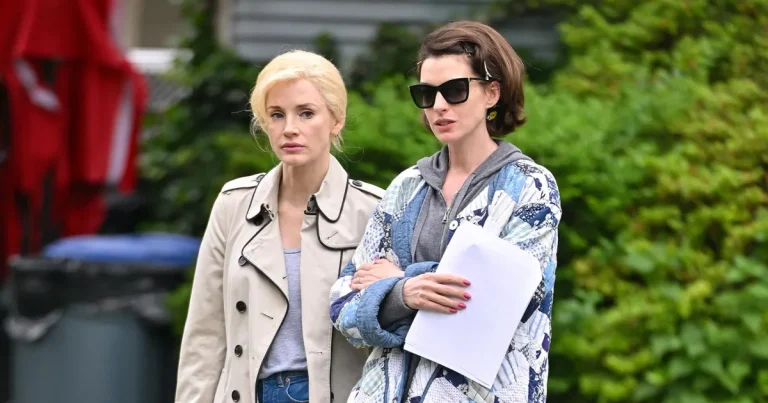You Won’t Be Alone (2022) Movie Ending Explained & Themes Analyzed: You Won’t Be Alone is a 2022 horror film directed by Goran Stolevski from a screenplay by him, in his directorial debut. It can be best described as horror adjacent, a story about a young witch curious to live life as a human, who starts to live under the skin of the humans she kills, which dovetails into the evolution of her perspective as she lives her life through humanity and different genders and species.
*spoilers ahead*
You Won’t Be Alone Plot Summary and Synopsis:
Prologue & the first act:
You won’t be alone opens in 19th century Macedonia with a cat softly pattering through beautiful grassy knolls and entering a mountainous village. She is slowly revealed to be a mythical witch named Old Maid Maria (Anamaria Marinca, completely unrecognizable under heavy makeup, resembling Freddy Kreuger with her burnt and scarred face), who is after a newborn child for unknown but presumably sinister reasons.
The world very much resembles a fairytale written by Hans Christian Anderson or The Brothers Grimm, and in this world, the witch happens upon the mother of the newborn baby. Upon witnessing the Wolf-Eatress, who demands the innocent infant, the desperate mother makes a deal, to let her raise the girl until she turns sixteen, after which the witch can claim her as her own. The witch agrees after a covenant with the mother whereby the child’s vocal cords were ripped out. The mother then hides the child in a cave to protect her from the dangers of the Grimm fairy tale world she finds herself in, only to be discovered 16 years later by the witch in the form of a raven.
Her mother, who visits her periodically, sees the raven and tries to stop it from taking her, recognizing full well the raven’s identity. There is a scuffle as the raven flies behind a rock structure in the cave, the mother following it, trying to shoo it away. The child watches as a woman resembling her mother, but not her mother as she could identify by the changed mannerism and the steely determination in the witch’s eyes instructs the child to follow her.
The young girl follows Maria out of the cave, where she is bedazzled and assaulted by the senses as the colors and sounds of the outside world overwhelm her and the visuals in the movie. Her acclimatizing to the world around her is antithetical to Maria’s pace of teaching, who reaches a small stone stable and immediately feeds on the goat tied there, Maria intently looking at the unfamiliar shape of a lamb. Before she could react to Maria’s bloody hands or the blood-stained face, Maria scratches her chest and spits on the wounds imparted by those scratches. Then later, she uses a burning twig to cauterize those wounds, apparently, but to Nevena’s (the young witch’s) surprise, the wound heals.
As the barrage of information assaults Nevena, she sees her nails protruding outward, with a nail protruding from each of her wrists. She also sees Maria ditch the appearance of her mother by slowly pulling out the intestines and the entrails of the body from an orifice on the left side of her chest. As she walks along, dropping the intestines and entrails, Nevena sees Maria transform into her original, pockmarked, burnt appearance. And according to Nevena, in her broken platitude heavy voice-over, the bits of her original mother, or “whisper mama,” are gone, and only “the witch-mama” remains, who is far crueler and unsympathetic to Nevena’s curiosity and naivete regarding the world surrounding her.
When Maria kills an unsympathetic shepherd who showed interest in Nevena, she berates her by hammering on her lack of knowledge about the cruelty of the world and men. The increase in derision gets amplified as Maria sees herself stroking a rabbit, unable to fish, or hunt for herself. In a way, the lack of empathy in Maria, perhaps intentionally, chooses Nevena to act out against her. After a tussle, Maria leaves Nevena, proclaiming her to be a fool to think of Maria as a mother. She gorges on a wolf, transforms herself, and leaves Nevena to her own devices in the wilderness.
Boslika (Nevena #2)
Nevena comes across a village, where she sees Boslika (Noomi Rapace) giving birth to a baby. Decidedly curious about that concept, and also having seen so many people for the first time, Nevena sneaks into the village the next day, managing to hide in a barn. There she sees a basket with a baby lying in it, crying. She is immediately discovered by Bosilka, who tries to keep Nevena from her baby at arm’s length, but Nevena kills her.
Unable to understand what to do, she squeezes open the cavity in her chest, cuts open her stomach, pulls out the intestines, and pushes them inside her cavity. Her body transforms into that of Bosilka, while Bosilka’s old body disappears. As Bosilka slowly comes to understand the rudimentary aspects of a family unit, the cruelty of Bosilka’s husband, who dismisses Bosilka’s running around naked as “woman madness”, and Bosilka’s mother-in-law, who advises her to accept the bestial and sexist nature of her son and her husband. She also learns how to cook, wash her clothes, and understand the basic tools of communication by pretending to emote her feelings wherever appropriate.
All the while, Maria watches her from afar with a curiosity befitting an academic nature. She also tries to understand how “eye-water” works, a phenomenon she attributes to something the man wants, realizing that she can’t produce it. Her perspective on man is decidedly more clinical and horrifying in its simplicity. For a man, she is like water, able to be bent by the violence emanating from his hands. For a woman, she is like a glass, able to understand and reflect on the emotions around them to make them comfortable.
However, her pursuit to understand humanity temporarily comes to an end. Firstly, Maria reveals herself to Nevena, able to harshly but succinctly tell her that her disguise is a flimsy one, and she is acting by choosing herself to go back to the four walls, a prison of her own making, inadvertently reverting to her world inside the cave. She ends the conversation by rhetorically asking her whether she was the first one to try her, and implying that this isn’t going to end well. Temporarily, that prophecy comes true because Boslika’s husband tries to consummate with her that night. The unfamiliarity of the entire process, along with the rough nature of her husband, causes her to react by killing him. Deciding to run, she slowly removes the entrails from her chest cavity, enabling her to revert to her old self and escape to the wilderness as blood and gore lie in her wake.
Boris (Nevena # 3)
Perhaps to experience life differently, she transforms herself into a dog. Like a dog, she comes across a group of men bathing in a lake and ogling the women who have come to the banks to collect water in their pots. Having seen the man as cruel and violent, this happy-go-lucky version of the man intrigues her. She follows the group and stops outside the village where they are from. She abandons her canine form and washes into the lake, naked, as bait for the man.
The man, curious, follows her and meets her at a forest clearing. She examines the man’s body by touching him, which the man misconstrues as a sexual advancement and responds in kind. Like last time, they try to have sex, but she kills him. She then transforms and bathes, looking at himself and his member, his appearance, and his physicality. He soon walks back to the village. He learns to plow the fields, to thresh, and to roam around in reckless abandon, but he soon sees the little girls in that village playing with dolls, one doll structured eerily like Old Maid Maria.
He tries to examine that doll, but his peculiar behaviour attracts the attention of the women of the village, who enact a ritual to exorcise the evil spirit within. However, the women also suspect that the Wolf Eatress might not have left him unscathed, so they try to “cure” him, which almost feels like a form of acceptance. That simplicity, the moment of physical contact of hugging individuals, changed Boris, who could feel the floodgates of emotions rising within him.
As is customary, Maria appears to Boris one day, and like fables of old ending in sinister prophecies, she again asks him whether he can disguise himself, this time dressing in the skins of corpses, warning him again that this won’t end well. On returning, Boris sees a man berating his young boy for not chopping more than two logs of wood. Both of his parents berate him for his failure, warning him to not enter the home until all the logs have been chopped. Sensing a kindred spirit in the boy, he chops the logs for the kid. He also experiences the joys of sexual pleasure for the first time, when a woman invites him and dominates him, and he becomes overwhelmed by the assault on his senses.With the life of a man in the village passing him by, life was comfortable, until he discovers a girl has fallen off a cliff. Realizing that the girl is about to die and perhaps finally realizing that he has a chance to have the childhood he had been deprived of, he transforms into the girl and escapes into the forest.
After a while, the girl stops in the forest, and the villagers, unable to find the man or the body of the girl who has fallen off the cliff, search for her and manage to find her. The love of childhood, of having people around her showering her with love, while the phenomenon of growing up as a normal woman astounds her with a pleasant surprise. She slowly starts to grow and also becomes close with the boy whom she helps chop logs. This is also when she finally learns of the story of Old Maid Maria, through the version of an old wives’ tale told by her grandmother while telling the story near the campfire.
Related to You Won’t Be Alone Movie Explained – X (2022) Movie Explained: Review & Ending Analyzed
The Origin of Old Maid Maria:
Centuries ago, Maria was a spinster, content to live as an old maid in a village that had no boys left. She looks after her ailing father and does all the work around their little hovel. In a desperate moment, she begs her to find her a husband and a child so that her life can progress. The witch brands Maria with the witch’s spit and walks away. Later, Maria is visited by a man who requests her assistance from her father on behalf of his ailing son. As Maria goes to their house to meet with the son, whom we see is dying, she is forced to marry and have sex with him because, according to the son’s mother, a man who has spread no seed is not a man.
Forcefully having her consummate also causes Maria to fall sick. To seek nourishment, she kills cattle and drinks their blood, perhaps to heal herself. However, she is discovered and her actions brand her as a witch in front of the villagers. She is punished and ordered to be burnt at the stake, but the fire doesn’t kill her. Having been affected by the witch’s spit, the fire activates her witch abilities, effectively making her immortal, but her body is burnt and scarred for all eternity.
Biliana (Nevena #4)
Biliana grows up into a woman and falls in love with the boy, now grown into a handsome, strapping but shy young man. They are attracted to each other and decide to marry. She gets advice from the elders of the village on how to behave demurely and be bent to her husband’s will. But once left alone, she takes charge. They consummate. She slowly starts to understand her love for him, that incomprehensible feeling that goes deeper than flesh. And because of this revelation, she decides to tell him the truth about her, even after being warned by Maria that the knowledge of the truth will only cause her pain. But for the first time, her optimism works, because the man accepts her.
Time passes, and we see Biliana pregnant, enjoying a peaceful life with her husband. Until one day, while working in the barn with the other women, she hears a noise. She hurries out and sees a wild boar with its tusk caked with blood, standing outside their house. As her worst fears come to pass, we see the boar walk away, as Biliana runs towards the door to see her husband’s battered and mutilated body. She screams in grief as we see Maria walking away into the forest. Her husband is buried, with her father-in-law placing the blame for bringing this evil upon her, but her mother-in-law is privy to the truth: the wolf-eatress is riddled with envy and seething with rage as a result of it.
You Won’t Be Alone Movie Ending Explained:
Biliana gives birth to her baby and immediately closes the doors to her place because she knows the witch is lurking in the shadows. She can’t sleep, staying awake with the baby tucked under her arms until the women around her reassure her that nothing would come to harm to the baby while they are around. But her dreams manifest her fear, refusing to let her sleep.
Maria arrives one chilly morning after gathering dry branches to keep the fire burning in her fireplace as winter approaches. As she proceeds to close the door and lock the windows, she finds her midwife lying dead in a pool of blood. She enters the room where her baby is to find Maria standing over her. Maria ridicules the baby, asking what is so good about this runt that came from her innards, before slicing the child’s neck.
In horror, Biliana kills a goat and gorges on its blood, then uses the witch’s spit to brand her baby and lights one of the twigs on fire to activate the witch’s ability, which saves the baby from dying. Maria watches all these events unfold, seemingly nonplussed but internally affected, and as she sees Biliana’s love for her child transcend her fears of her being a witch, she asks the question which must have pondered her for so long: “How is it so easy for you?”
Biliana, in response, puts her baby down, walks up to Maria, and kills her by delving her nails deep into her flesh and pulling her innards out. As Maria dies, freed from her centuries of torment, Biliana looks at her baby and remembers all the lives she has led, from Bilia to Boris, to Boislika, and finally to Nevena, through all the losses and violence and cruelty, and yet, her heart fills with hope for a peaceful future.
You Won’t Be Alone Movie Themes Explained:
The Magic
Calling “You Won’t Be Alone” a horror movie would be limiting the innumerable ideas Stolevski wants to portray through the lens of Serbian-Macedonian folklore. Themes of maternal instincts, cruelty, and hope springing eternal are all encapsulated in a story touching very heavily on body horror, gore, and the mystical realm. The magic shown here is less ethereal, earthier, and more reliant on soma than on spells. It follows the folkloric formula of magic always having a cost, power beyond the real always coming at the cost of violence or blood. The magic shown here is also far more complicated and like most magic shown in folklore heavily based on rules, which the movie uses visual exposition to explain.
The process for one witch to transform a normal human being into another witch seems like a natural inevitable process for them, making them forces of nature. They utilize the sharp nails to scratch the left side of their victim’s chest and then having gorged on their next meal, use blood and spit to make the scratch and wound become fresh and tender. Blood seems to be their meal of choice, emphasizing the primal or bestial quality of these mythical creatures.
The important part is cauterizing the wound with fire, which activates the healing power as well as the other attributes, like the sharp nails in the victim, transforming them into a witch. It also makes them essentially immortal, with the ability to take the entrails out of their victim and absorbing the victim’s essence by literally stuffing them in the cavity. That gives them the ability to physically transform themselves and live in the skin of their victims.
The witch also feels like a mythical creature more prone to crafting Faustian deals with their victims, as folkloric tales proceed in their narrative. They aren’t a lot that could be trusted by anyone of a sound mind, but Maria is a witch very much governed by hatred, anger, and envy, a far cry from the witch we had seen who transformed Maria herself, who had shed all manners of pretending to be civilized and just be primal. However their immortality is relatively temporary, and this is just me extrapolating, but it seems a witch could only be killed by another witch, like Maria finally being killed by Biliana.
Gender Fluidity:
Even more interesting is the inherent gender fluidity. Nevena’s exploration of humanity through the skins and lives of different humans evolves her perspectives from both male and female points of view. Her growth evolves substantially. As Boslika was the closest to the fish out of the water, her relationship with narcissism and sexism affects the cruel behavior she experiences.
As a result, even her naivete and her lack of speech were attributed to being caused by the domestic abuse, if not directly, but indirectly implied. Similarly, her experience as Boris is markedly different. The freedom and the physical exertion she experiences as a man. However, her feelings transcend these boundaries of gender, which the movie tries to hammer home as a central point. In its efforts to break conventionality, Stolevski crafts a narrative very much gender fluid, both in terms of fluidity of appearance and living in one’s skin, as well as the fluidity of the narrative.
Maternal instinct and the resilience of humanity:
The movie also touches on the maternal instinct permeating the relationship between these two women. Maria, perhaps due to her not having the life she wanted, and then being forced to go through immeasurable cruelty and being effectively cursed to live forever, is a woman lacking in empathy, unable to entertain the notion of enjoying the beauty surrounding her as time passes away. For her, fireflies are as meaningless as fish. They are only blood, not playthings.
On the other hand, Nevena’s relationship with her “whisper-mama” affected her deeply, however brief it was because her definition of maternal love stemmed from her missing her “whisper-mama” even as she got quasi-replacements in the form of Bosilka’s mother-in-law, and later as Biliana, the rest of the women in her village supporting her as she grows up from Biliana the child to Biliana the woman.
Thus, her maternal instinct is developed, honed, and given added dimensions, which is why her hesitation is absent when she finds her child is dying. Unlike her whisper mama, whose only hope was to make a deal for a limited amount of time, she had the resource to save her and, by killing Maria, end the vicious cycle that Maria would have perpetuated elsewhere. Maria’s envy too stems from the happiness and the baby steps Nevena takes to understand humanity, and despite the cruelty she faces, the strength to empathize and to love, something which has been hardened to the point of being non-existent for Maria, after centuries of roaming around as an immortal mystical monster.
You Won’t Be Alone Movie Review:
You won’t be Alone is a movie that is very much a meditative and slow joint. The presence of voice-overs with broken sentences and communication, along with beautiful imagery of nature, gives the vibe of a Terrance Malick movie. Body horror in the vein of a Terrance Malick narrative might sound exciting and unique on paper. Upon execution, it feels too dependent on layers and themes and subtext and not on crafting just a coherent story.
Nevena’s experiences, each time she consciously semi-reboots, become repetitive like most folklore could be, with prophecies or morals repeating at regular intervals in each act of the story until the climax. But as a fable, the repetition screams redundancy. There are also moments when the visual expositions are hampered by the audio voice-over.
Instead of imparting a feeling of mystery, all it succeeds in doing is producing a feeling of pretentiousness, of trying too hard to be in-depth instead of making do with what the story already has. As a result, the movie suffers from huge pacing issues, with moments where it feels like nothing is happening, but as the above suggests, quite a lot is happening. There’s also the question of this being marketed as a horror movie, which it isn’t.
Even if the violence is shown on screen, the visceral nature of horror depends more on the violence being shown more prominently on screen than on the camera moving away from the violent moments and resting on their implications. That works when the inciting incident and the action preceding the violent result are made clear. We know Nevena kills twice during sexual intercourse, but we are never really shown how not even hinted at.
As a folkloric fable, it feels like a Grimm Brothers or Hans Christian Anderson film come to life, but it is too involved in creating a meditative, beguiling film to be the pulpy tales that those were. The movie ironically suffers from a bout of an identity crisis, but there is no denying that the technical aspects of the film are sound.
The cinematography by Matthew Chuang is deeply infused with color and breathtaking. The academy ratio, though, felt unnecessary. The music by Mark Bradshaw fits the narrative nature of a fluid, meditative, and beguiling story at times. As for the performances, Noomi Rapace has far less screen time than you would expect, but she leaves an impression.
However, the two strongest performances are by Sara Klimoska as Nevena and Alice Englert as Biliana. As Nevena Kimoska manages to bring to light the naivete and curiosity of the character, she is faced with the outside world with all of its peculiarities. As Biliana, Englert manages to show the vulnerability and inner strength of a woman having lived a fulfilling life and doing everything in her ability to keep that life unscathed. While You Won’t Be Alone feels both overstuffed and surprisingly under-cooked, it does create an interesting concoction of a movie, by a genre filmmaker whose work would be curious to see moving forward.
You Won’t Be Alone (2022) Movie Links – IMDb, Rotten Tomatoes
You Won’t Be Alone (2022) Movie Cast – Noomi Rapace, Carloto Cotta, Alice Englert, Sara Klimoska, Anamaria Marinca, Arta Dobroshi



